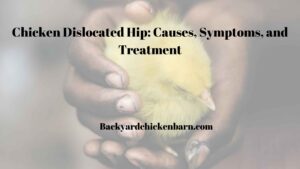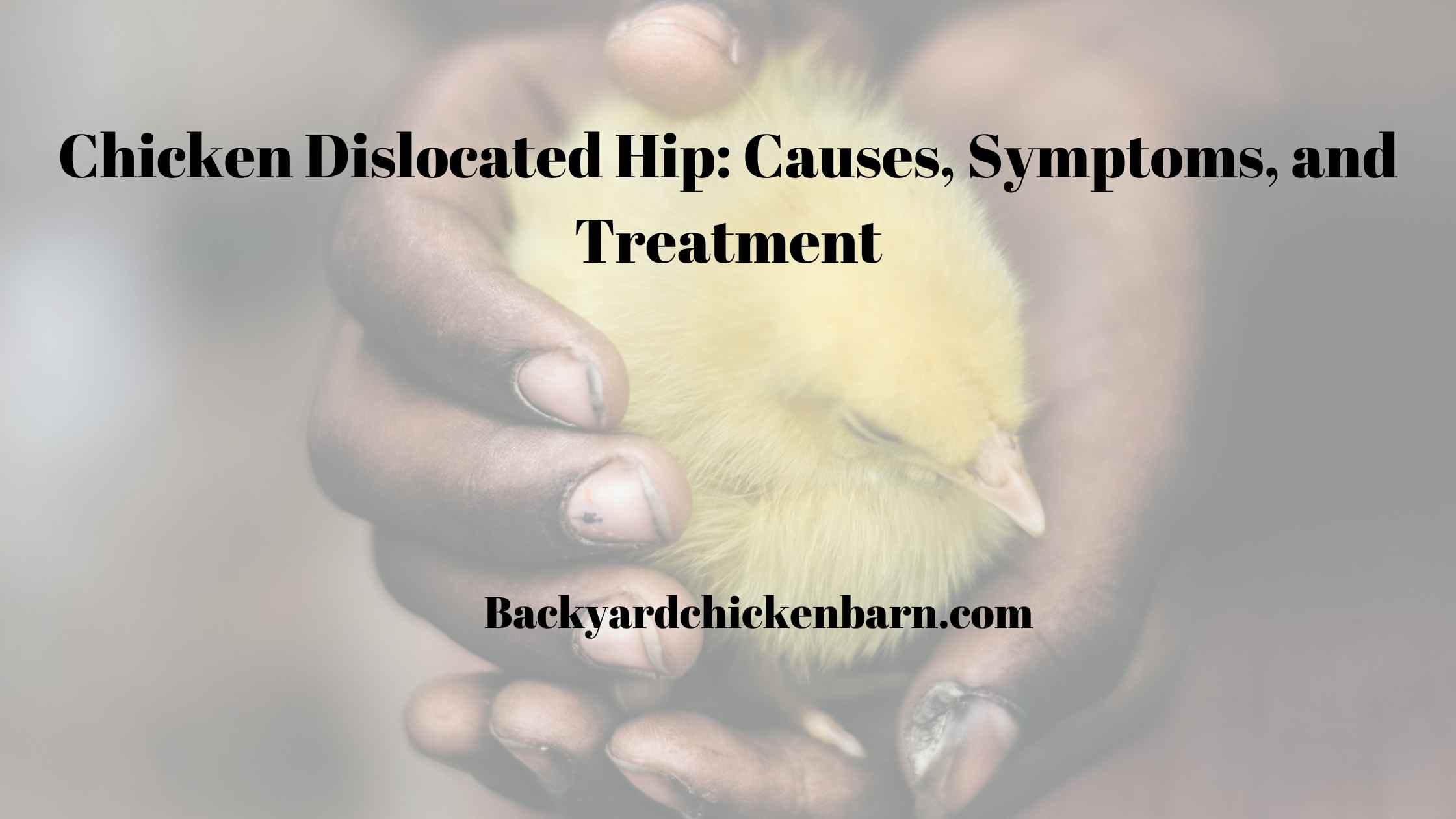Chicken Dislocated Hip: Causes, Symptoms, and Treatment
A dislocated hip, or hip luxation, is a condition where the head of the femur (the thigh bone) slips out of its socket in the pelvis.
Though less common in poultry compared to other injuries, it is essential to be aware of the causes, signs, and treatments to ensure the health and well-being of your flock.
Causes of Dislocated Hip in Chickens:
- Trauma: This is the most common cause. A heavy blow, a fall, or an awkward landing can push the femur out of its socket.
- Poor nutrition: Lack of essential nutrients can weaken the ligaments that hold the joint in place, making dislocations more likely.
- Congenital issues: Some chickens might have an inherent weakness or structural abnormality in the hip joint.
- Excessive activity or sudden movements: Especially in heavier breeds, rapid movements can sometimes cause hip dislocation.
Symptoms:
- Limping: The most noticeable sign will be a pronounced limp on the affected side.
- Swelling: The area around the hip joint might become swollen.
- Pain: Chickens may vocalize more or display signs of discomfort, especially when the hip is touched or when they try to move.
- Abnormal posture: The affected chicken might sit more often or lie down, avoiding putting weight on the injured leg.
- Reduced activity: Less willingness to roam, forage, or interact with other flock members.
- Decreased appetite: Due to pain and stress.
Treatment:
- Isolation: Place the injured chicken in a quiet, safe, and comfortable space to prevent further injury.
- Manual reduction: This is the process of gently manipulating the leg to slide the femur back into its socket. It should be done with caution and preferably by someone experienced, like a veterinarian.
- Immobilization: After realigning the joint, it’s essential to immobilize it for a while to allow for healing. This can be done using a bandage or a splint.
- Pain management: Over-the-counter pain relief suitable for chickens can be given, but always consult a veterinarian for dosages.
- Nutritional support: Ensure the chicken receives a balanced diet rich in vitamins and minerals to support recovery.
- Physical therapy: Gentle movements can help restore mobility and strength over time.
- Surgery: In severe cases or if manual reduction fails, surgical intervention might be necessary.
Prevention:
- Safe environment: Ensure the coop and run are free from obstacles that might cause injury.
- Nutrition: Feed a well-balanced diet suitable for the age and breed of the chicken.
- Regular checks: Periodic health checks can help in early detection of problems.
- Limit high perches: For heavier breeds, lower perches can reduce the risk of injury from falls.
In conclusion, while a dislocated hip in chickens can be concerning, with prompt attention and appropriate care, many birds can recover and lead a healthy life.
ALSO SEE: Dislocated Chicken Legs
Always consult with a veterinarian if you suspect a severe injury or if you’re unsure about the best course of action.

FAQs on Chicken Dislocated Hip
- What is a dislocated hip in chickens?
A dislocated hip occurs when the head of the femur (thigh bone) slips out of its socket in the pelvis. - How can I tell if my chicken has a dislocated hip?
Symptoms include limping, swelling around the hip joint, vocalizing pain, an abnormal posture, reduced activity, and decreased appetite. - What causes hip dislocation in chickens?
Causes can include trauma, poor nutrition, congenital issues, and sudden, forceful movements. - How do I treat a chicken with a dislocated hip?
Treatments include isolation, manual reduction, immobilization, pain management, nutritional support, physical therapy, and in severe cases, surgery. - Can a chicken recover fully from a dislocated hip?
Yes, with proper care and treatment, many chickens can recover and lead a healthy life. - Do I need to see a vet for a dislocated hip?
It’s recommended, especially if you’re unsure about the diagnosis or treatment. - How long does recovery typically take?
Depending on the severity, recovery can take anywhere from a few days to several weeks. - Can I manually reposition the hip myself?
While it’s possible, it’s recommended to have someone experienced do it, preferably a veterinarian. - Is surgery common for dislocated hips in chickens?
Surgery is reserved for severe cases or when other treatments fail. - How can I prevent hip dislocations in my flock?
Ensure a safe environment, provide proper nutrition, perform regular health checks, and limit high perches for heavier breeds. - Are certain chicken breeds more susceptible?
Heavier breeds might be at a higher risk due to their weight and potential falls. - What kind of pain management is suitable for chickens?
Over-the-counter pain relief suitable for chickens can be used, but always consult a veterinarian for dosages. - Should I separate an injured chicken from the flock?
Yes, isolating the injured bird prevents further injury and reduces stress. - What kind of diet supports recovery?
A balanced diet suitable for the age and breed of the chicken, rich in vitamins and minerals. - How do I immobilize the hip joint?
This can be done using a bandage or a splint, but it should be done carefully to avoid causing more injury. - Is a dislocated hip a common injury?
While not the most common injury in poultry, it does happen and should be addressed promptly. - Can other animals in my farm be a risk factor?
Larger animals or aggressive ones might accidentally injure chickens, leading to such issues. - Does age play a factor in hip dislocations?
Older chickens might have weaker ligaments, but any chicken can suffer a dislocation. - What are the complications if left untreated?
Complications can include permanent lameness, joint deformities, and severe pain. - How is a dislocated hip different from a broken leg?
A dislocated hip involves the joint, while a broken leg involves a fracture in the bone. - Can a chicken live a normal life after a hip dislocation?
With proper care, many chickens can resume a normal life post-recovery. - What’s the difference between a dislocated hip and hip dysplasia?
A dislocated hip is an acute injury, while hip dysplasia is a developmental condition where the hip joint doesn’t form properly. - How do I provide physical therapy for my chicken?
Gentle movements and massages can help, but seek guidance from a professional. - Will my chicken need medication?
Pain relief might be necessary, and in some cases, antibiotics if an open wound is present. - How do I know if my chicken’s hip has healed completely?
Signs of complete healing include the return of normal activity, no signs of pain, and regular movement without limping. - Are chicks at risk of hip dislocation?
While chicks are resilient, they can still suffer from dislocations, especially from trauma. - How often should I check my flock for injuries?
Regular checks, at least once a week, can help detect and address problems early. - Can a chicken’s hip dislocate again after healing?
Yes, once a joint has been dislocated, it might be more susceptible to future dislocations. - What are the signs of a severe hip dislocation?
Extreme pain, inability to move the affected leg, and significant swelling are signs of a severe dislocation. - Should I cull a chicken with a dislocated hip?
Culling should be a last resort. Many chickens can recover with proper care. - How do high perches contribute to the risk?
High perches, especially for heavier breeds, can lead to falls and resultant injuries. - Can other health issues predispose a chicken to hip dislocations?
Health issues that weaken the ligaments or the overall health of the chicken can increase the risk. - Is there a genetic predisposition to hip dislocations?
While not common, some chickens might have inherent weaknesses or structural abnormalities. - How can I make my coop safer to prevent injuries?
Ensure the coop is free from obstacles, have lower perches for heavier breeds, and ensure adequate space for movement. - Can a hen’s egg-laying be affected by a hip dislocation?
Yes, pain and stress can reduce or halt egg production temporarily. - Are roosters more susceptible to hip dislocations than hens?
The risk is more about weight and activity rather than gender. However, aggressive mating can sometimes lead to injuries in hens. - Can I use human pain relief for my chicken?
Not all human medicines are safe for chickens. Always consult a vet before administering any medication. - Is there a specific season when hip dislocations are more common?
Not particularly, but slippery conditions in winter or rainy seasons might increase the risk of falls and injuries. - How do I reduce stress for my injured chicken?
Provide a quiet space, fresh water, and food, and keep them separated from aggressive flock members. - Are there any natural remedies to support recovery?
While proper medical care is paramount, some natural supplements like turmeric can help reduce inflammation. Always consult with a vet before introducing any remedies.


